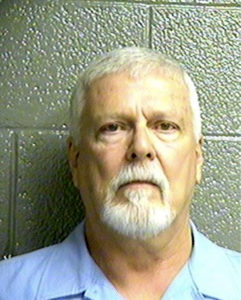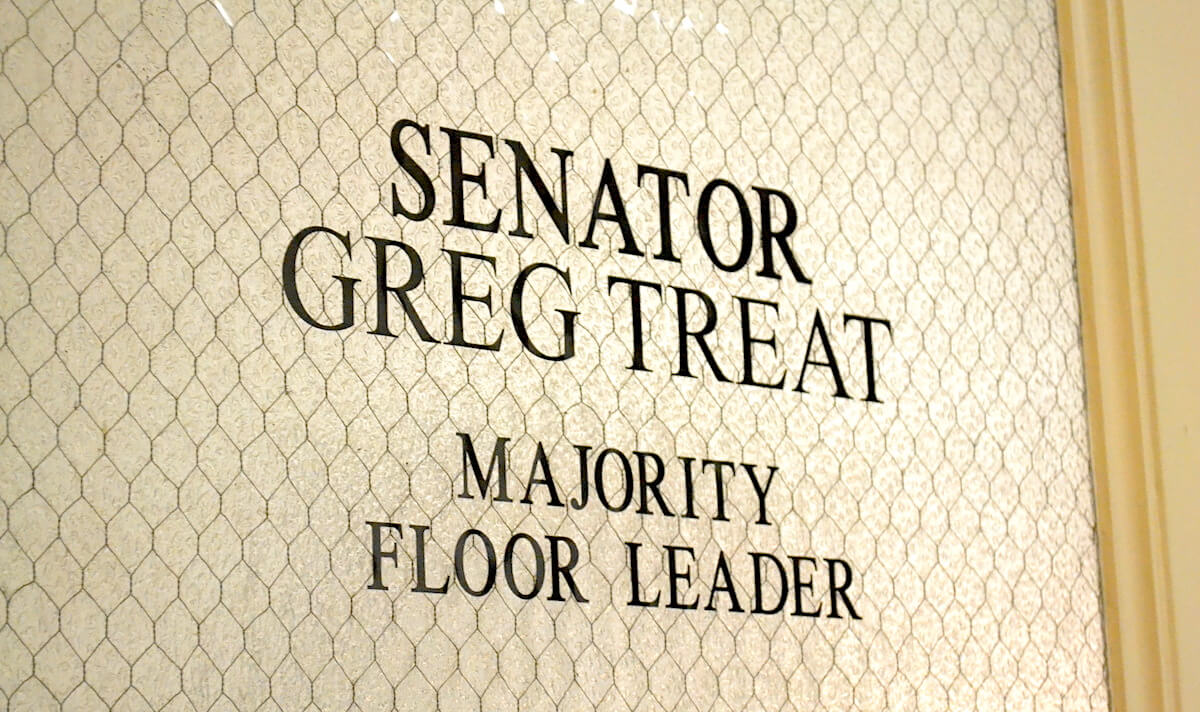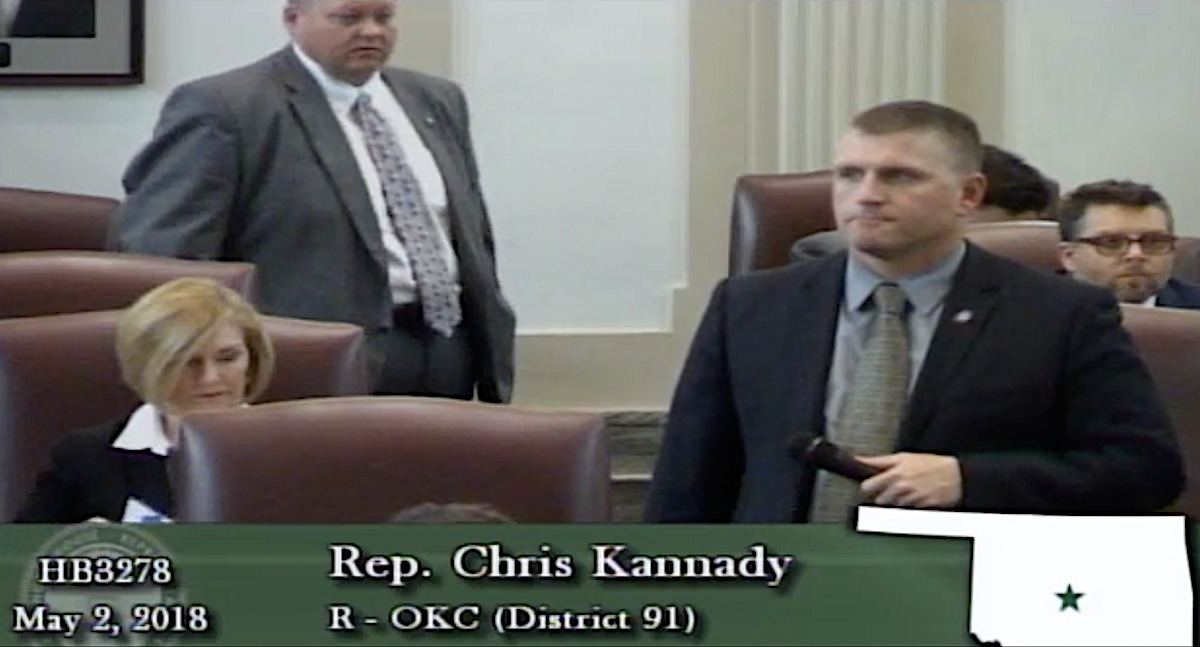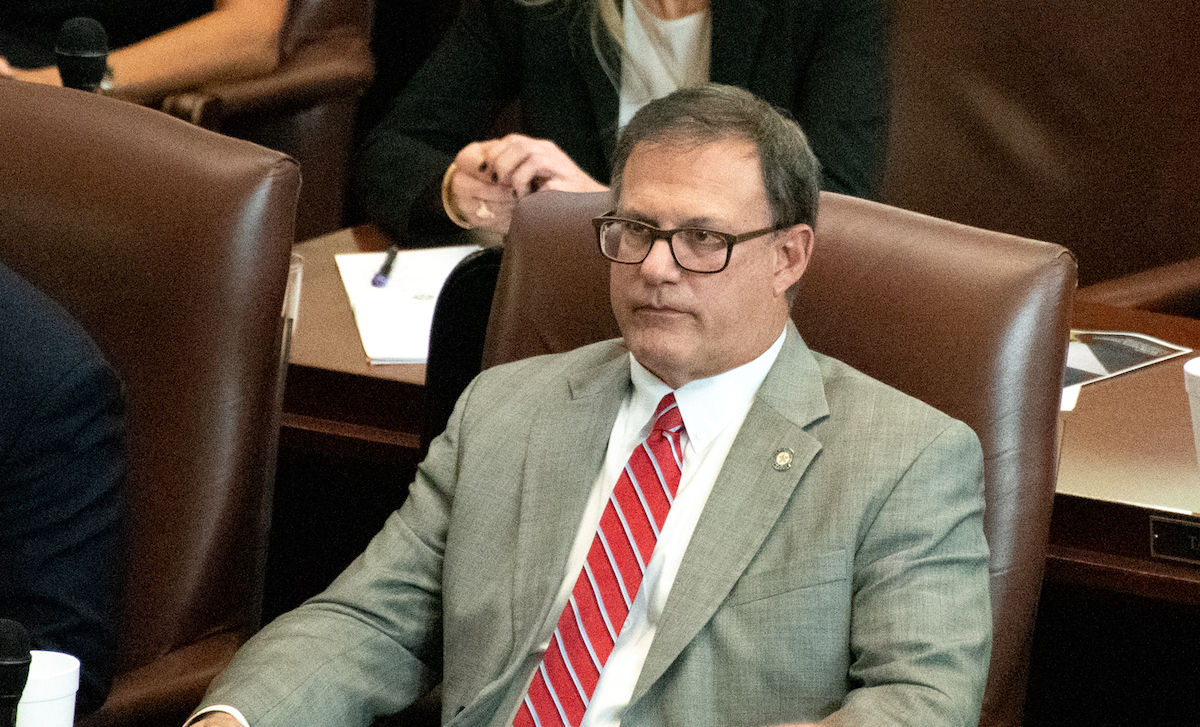

The year before indicted Rep. Terry O’Donnell (R-Catoosa) passed his 2019 bill allowing lawmakers and their families to be appointed Motor License Agents, Sen. Greg Treat stripped the same language from a 2018 bill by Rep. Chris Kannady, temporarily maintaining the prohibition on legislators having financial stakes in state-designated tag agencies.
The next year, O’Donnell successfully ran the language himself. One month after the law took effect, the Oklahoma Tax Commission approved O’Donnell’s wife, Teresa, to succeed her mother, Georgia McAfee, as tag agent in Catoosa, “subject to qualifying under the law.”
In December 2021, an Oklahoma County grand jury alleged that Terry and Teresa O’Donnell’s actions qualified as a criminal conspiracy under the law. Now, key legislators have answered further questions about the 2018 and 2019 tag agent bills at the heart of the O’Donnells’ indictment.
“I didn’t know it was Greg Treat that was holding it up,” O’Donnell said of the 2018 bill. “Maybe I should send him flowers for trying to keep me out of what ultimately ended up being a jam for me.”
The murder of J.B. Hamby, the escape of David Smith
Greg Treat grew up in Catoosa, a 7,000-person community east of Tulsa best known for a blue whale roadside attraction and the state’s only port connected to international waters.
But when Treat was 4 months old, a violent crime shook his hometown and ensured that the future president of the Oklahoma State Senate would recognize Terry O’Donnell’s interest in a pair of House bills 40 years later.
On Sept. 1, 1978, two men robbed the Catoosa Tag Agency and tied up the employees with duct tape. One of those employees was Georgia McAfee, O’Donnell’s future mother in law.

In responding to the robbery, Catoosa Police Chief J.B. Hamby shot and killed one of the robbers, but he was also fatally wounded. The other robber, David Gordon Smith, was apprehended two hours later at a Tulsa hospital.
A jury convicted Smith of murder and sentenced him to life in prison, although he quickly received “trusty status” and was granted additional privileges. He owned real estate and got married. In October 1985, when a guard checked Smith’s bed at the Jackie Brannon Correctional Center in McAlester, he found a dummy. Smith had escaped, and he fled the state with his wife.
Seven years later, Smith’s prison escape was featured on Unsolved Mysteries. After the episode re-aired in 1993, Smith and his wife were recognized and captured in South Dakota. Smith is now incarcerated at the Lexington Correctional Center.
But the public service of Georgia McAfee and the shock of the 1978 tag agency robbery lingers for some longtime Rogers County residents, and it meant that Treat knew the history of the Catoosa Tag Agency.
“I am from Catoosa, Oklahoma,” Treat said. “I was aware of who [Terry O’Donnell’s] mother in law was.”
O’Donnell said he learned the story about a year after he married McAfee’s daughter, Teresa.
“When they came to interview Georgia, that was when I learned all of that stuff. She didn’t really talk a whole lot about that before Unsolved Mysteries came to town,” O’Donnell said. “Georgia had been the tag agent there for 45 years before she died, and her mom before her was tag agent. So that was one of the reasons my wife was interested in being tag agent before [her mother] passed away.”
‘The purpose was to streamline the process’

Georgia McAfee died two days before the Tax Commission appointed her daughter as tag agent on Aug. 1, 2019. The day before her death, Terry O’Donnell had submitted his wife’s application and a contingency retirement letter from his mother in law, stating she would relinquish her appointment if her daughter received it.
That would not have been possible without the 2018 tag agent bill authored by Rep. Chris Kannady (R-OKC) and carried in the Senate by Treat, who served as majority floor leader at the time. When HB 3278 received its first House committee hearing, it featured two components:
- Switching the prohibition on tag agency ownership from legislators and their families to employees of the Oklahoma Tax Commission and their families;
- Allowing an existing tag agent to designate their replacement with a contingent letter of resignation.
By the time the bill finished its journey through the 2018 session, however, only the contingency letter portion remained.
Clayton Taylor Sr., the executive director of the Oklahoma Tag Agent Coalition, said contingency letters had historically been considered influential when appointing replacement tag agents, but his association sought to codify that process in statute.
Kannady and O’Donnell both told NonDoc the contingency letter language was the portion of the bill brought to the table by Kannady. Both men also agreed that O’Donnell sought to repeal the prohibition against lawmaker interests in tag agencies.
“The purpose was to streamline the process,” Kannady said of his 2018 bill. “So I had a vehicle available. I was approached by Terry O’Donnell to put the language [in about who is prohibited from being a tag agent]. I didn’t know why, I didn’t care. I recall there being some discussion about it taking out superfluous language that wasn’t needed anymore because senators did not appoint tag agents anymore.”
Indeed, the three-member Oklahoma Tax Commission now appoints tag agents. O’Donnell said his portion of the 2018 bill sought to reflect “the conflict of interest being with the Tax Commission, because they had the appointments.”
When HB 3278 contained both provisions, it originally passed the Oklahoma House of Representatives by a 67-7 vote. But Treat, the bill’s Senate author, used a procedural amendment to send the bill into a “conference committee,” where stakeholder legislators try to agree upon final language before re-presenting it to both chambers.
When HB 3278 emerged from conference committee, the law prohibiting legislative family members from being appointed tag agents remained intact.
“I didn’t feel comfortable with that portion of it. And to the best of my recollection, that’s the reason I didn’t want title on it and why we sent it to conference,” Treat said.
Kannady: ‘People add amendments all the time’

While Treat was the legislator who stopped O’Donnell’s proposed language in 2018, Kannady was the bill’s original author.
Kannady said he was pursuing the contingency letter language because of a prior situation when a tag agent died and citizens were left without a functioning tag agency for a period of time in Pittsburg County, where Kannady grew up.
“We were going to try to figure out what it was going to say in order to streamline the transition from tag agent to tag agent — for instance, if someone had passed away,” Kannady told NonDoc.
Kannady said he did not object when Treat asked to remove O’Donnell’s portion of the bill in conference committee.
When Kannady presented HB 3278 on the House floor again, he called the removed portion about legislative interests in tag agencies “extraneous language.”
“For my purposes it was,” Kannady said recently. “Many times, we run bills and people add amendments all the time because of the way our process works. If you don’t have a vehicle, you go find a member (who does), and you insert language if they agree to it. And frankly, I don’t think people sit back and wonder, ‘Why?’ You just assume people are running bills and they have a purpose to do it. So it was extraneous to me because it was not my language, and it was preventing my language from passing.”
Although both are attorneys, Kannady and O’Donnell have not always seen eye to eye in the Oklahoma Legislature, and O’Donnell’s indictment has not improved the relationship.
In 2020, each man ran for the speaker pro tempore position, the second-ranking House leadership post behind Speaker Charles McCall (R-Atoka), one of O’Donnell’s closest friends in the Legislature. O’Donnell won the House GOP Caucus election and served as speaker pro tempore until he resigned from the post in January.
Prior to former Attorney General Mike Hunter’s sudden resignation in May 2021, Kannady had been a key legislative and political ally.
O’Donnell and Hunter, however, clashed in 2019 over the handling of the state’s lawsuit against Purdue Pharma. In public statements since being charged, O’Donnell has blamed his prosecution on “political operatives”
“This all started when I sought to hold some very influential people accountable for gross abuses of power. This is retribution,” O’Donnell said in a January statement.
Indeed, Hunter did play a role in O’Donnell’s prosecution, having encouraged Oklahoma County District Attorney David Prater to look into O’Donnell’s tag agency legislation. Prater has said Hunter told him that he had an unspecified “conflict” regarding the matter. Earlier this spring, Prater said he had investigated an allegation about how Hunter convinced McCall to stall an O’Donnell bill regarding state agency contracts with private law firms.
Both Hunter and Kannady opposed the bill, which stalled in 2021 but has now passed the House and is awaiting final action in the Senate.
Treat vote against 2019 bill ‘pretty obvious’
Rebuked in his 2018 tag agency effort, O’Donnell authored HB 2098 himself in 2019 and landed another powerful co-author: Senate Appropriations Chairman Roger Thompson (R-Okemah).
When the 2019 bill faced final approval in the State Senate to allow legislators and their immediate family members to be appointed tag agents, Treat — who had become the upper chamber’s president — was one of only eight senators to vote against it.
“It was consistent with the same reason I put it into conference the year prior. I didn’t like that portion that allowed lawmakers’ families to own tag agencies,” Treat said of his 2019 vote. “I think it’s pretty obvious (why). I think it sends the wrong message, and I didn’t want to be voting on something that gave lawmakers more ability to contract with the state — or their families.”
Thompson and Gov. Kevin Stitt have both said House leadership articulated O’Donnell’s HB 2098 as a “priority” measure in 2019.
To what extent Stitt felt legislative pressure to sign O’Donnell’s bill remains a question before Prater’s grand jury, which is set to conclude its work this week.
“I had heard rumor of that, yeah,” O’Donnell said when asked if Stitt had crafted a veto message for HB 2098 prior to deciding to sign it into law.
‘When are you going to re-open?’

As the town of Catoosa approaches the 43rd anniversary of David Gordon Smith’s conviction in June, the ongoing saga of the O’Donnells’ prosecution is felt most directly by residents who need the services of a motor license agent.
Teresa O’Donnell resigned as state tag agent one week before being indicted with her husband in December, and the Catoosa Tag Agency has been shuttered ever since.
“There’s not a time we eat out in the community where somebody doesn’t say, ‘When are you going to re-open?’ and that kind of thing,” Terry O’Donnell said. “They think it is some sort of weird political misadventure, and I kind of agree with that.”




















